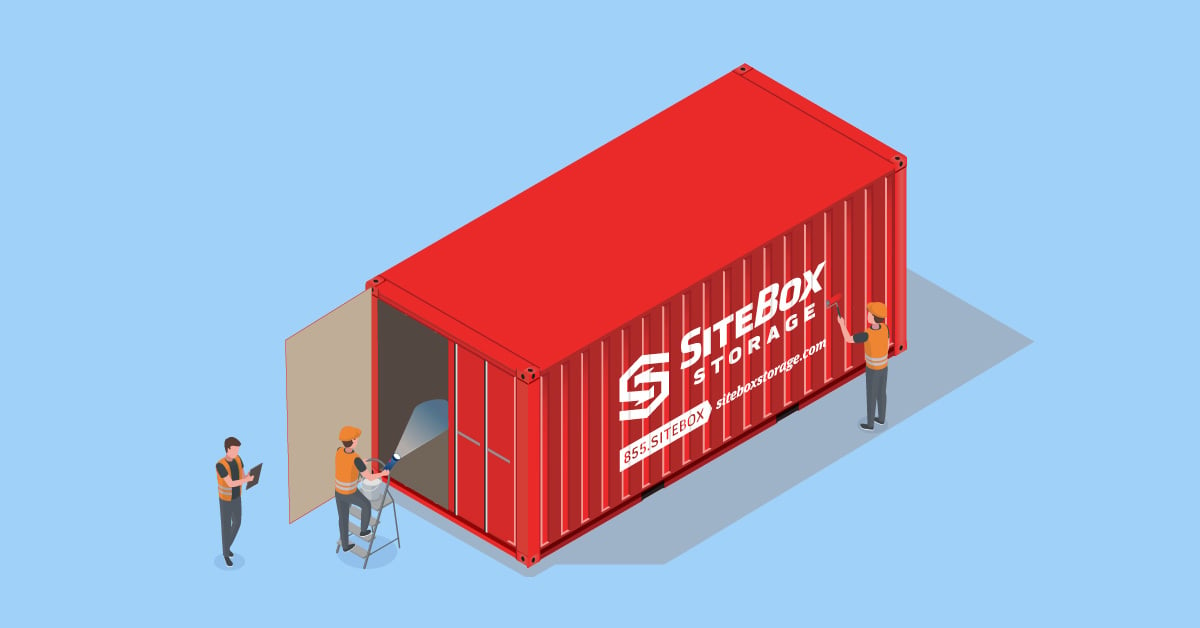Safety and Maintenance Best Practices for Portable Storage Containers

The kinds of companies that use portable storage containers now stretch beyond industries like logistics, construction, and retail. These sturdy, versatile units provide secure storage solutions and can also serve as temporary offices, pop-up shops at events, and even living spaces. Their functionality and reliability are due in some small part to their easy maintenance and rugged exteriors. Though few, there are some maintenance and safety protocols that come along with using portable storage containers.
Understanding Traditional Portable Storage Containers
When we talk about storage containers, especially in the context of logistics, construction, and retail, we're often referring to the robust and versatile sea can, cargo container, or conex box. These containers, originally designed for transporting goods by sea, have found their way into uses beyond their initial purpose that defy the imagination! In this post, we will explore the fundamental aspects of these onsite storage containers, to enhance your understanding and offer a few maintenance and safety practices.
The Basics of Onsite Portable Storage Containers
Storage containers are typically made from corrosion-resistant steel, making them durable against harsh weather and wear. The most common sizes include 20-foot and 40-foot lengths, though variations exist to suit different needs. For example, sometimes you’ll find 10-foot lengths, or extra-tall versions, called high cubes.
Some key features include weatherproof doors, sturdy locking mechanisms, and solid metal construction. The interior is often plain, allowing for easy customization based on usage requirements. Secure used containers also come in a range of categories, like Wind or Water-tight, As-is, and cargo-worthy.
Common Uses in Various Industries
Portable storage containers, with their robust build and versatility, have indispensable roles in several industries, each harnessing their unique features for diverse applications. In construction, they are often used as onsite storage for equipment, tools, and materials, due to their durability and security. In retail and E-commerce, they’re often used as storage for excess inventory or as a temporary warehouse solution. And, if you’ve attended an outdoor event or festival in recent years, you’ve probably seen them as secure, movable “pop-up” units that can be easily transported to different event locations. And, they’re often used as ticket booths or medical kiosks at these same festivals and on industrial work sites.
Advantages of Using Portable Storage Containers
Their design for transport makes steel shipping containers easy to move and set up in different locations. They’re constructed to withstand long sea voyages, offering excellent longevity and protection against environmental elements. This same ruggedness makes them a secure area for valuable items, with lockable doors and near-impenetrable walls.
Another of the advantages of container storage is customization. They can easily be modified with shelving, racks and internal doors, or even transformed into living spaces or offices.
Safety Protocols for Portable Storage Containers
When it comes to the handling and utilization of storage containers, adhering to established safety standards is crucial. This practical measure mitigates risks associated with their transportation, placement, and use. Preventing accidents is key to maintaining the container's condition and the safety of your team.
When transporting and placing conex boxes, only appropriate lifting equipment like cranes or forklifts, operated by trained personnel should be used. The placement of portable storage containers should be on a flat, stable surface, clear of overhead obstructions, with enough space for door operations and anchored properly, if necessary. When loading, observe the container's maximum load capacity and distribute the weight evenly inside. This prevents structural strain on the container and ensures stability during their transportation, especially for oversized objects requiring special loading practices.
If you’re renting a storage container, it’s also important to know if there are any rules and regulations around moving the unit once you have taken delivery. (Most companies that rent them as storage do not permit moving the container after it has been loaded.) It's best to have it delivered to the area where it will be used to prevent the need to move it later.
Addressing Common Issues and Troubleshooting
Even with the best maintenance practices, storage containers, like any other equipment, can encounter issues over time. Knowing what common problems to look for and how to address them will ensure their longevity and safety.
One common issue is rust and corrosion, particularly in containers exposed to harsh weather conditions over time. Regular inspections can help identify rust spots early, and prompt action, such as applying rust-proof paint or sealant, can prevent further deterioration. Another frequent problem is door alignment issues, making the doors difficult to open or close. It's important to provide a level surface for the container so the doors will open freely. This usually requires adjustment of the door hinges or replacement of worn-out parts.
Leaks are a concern in older shipping containers, especially if they haven’t been maintained. Regularly checking the roof and seams for any signs of wear and promptly sealing any gaps can prevent water ingress. It's also important to ensure that the container is properly ventilated to avoid condensation buildup, which can lead to internal moisture damage.
These concerns are primarily relevant if you're purchasing a storage container. In contrast, leased or rented units, such as those provided by SiteBox Storage, are typically used temporarily and undergo thorough inspections each time they return from rent. Frequent inspections ensure potential issues are immediately addressed before the units are deployed again. For long-term leases, problems are resolved promptly, minimizing disruption and ensuring the container remains in top condition for continued use.
Ensuring Longevity and Reliability with Portable Storage Containers
It's clear that these robust units have made their way into business as storage resources and much more. Their increasing prevalence in industries like logistics, construction, and retail is a testament to their versatility and reliability. However, it’s still important to commit to regular maintenance, and to understand the issues that arise (and their solutions).
The goal at SiteBox Storage is to provide secure, durable, and adaptable solutions for your storage needs. Contact SiteBox today!

